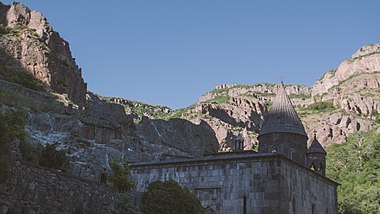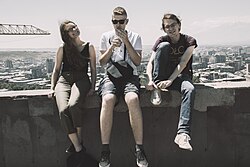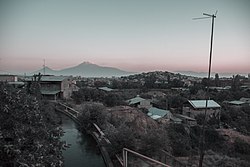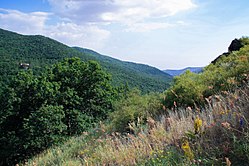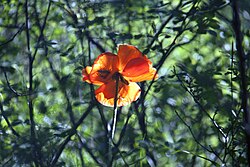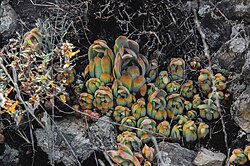WikiCamp 2017 w Armenii/Sprawozdanie
That's how the adventure begins
[edytuj | edytuj kod]It was middle of the night when Polish delegation for the Armenian WikiCamp have met in the bus heading to the airport.
We were of different age and totally different Wikipedia backgrounds – with me being a 'Wiki-baby' with just one article at that time, Celina using WikiMedia as a teaching tool during her university classes and Karol and Przemek being passionate editors for years. We had no idea what to expect for the next two weeks apart from 'some Wikipedia editing workshops and sport activities so take swimming suits'. Pretty general idea, right?
Yerevan
[edytuj | edytuj kod]But first we had two extra days in Yerevan to get to know the city before the camp's start. For me, Karol and Przemek it was the first time ever in the Eastern part of the world so we were bursting with curiosity. After some minor airports stresses and stunning views on the way we were welcomed by the WikiMedia Armenia delegation who took care of us during the day. They've provided us with the guide and the transport – sight-seeing was amazing and full of cultural delights. Starting from the first tastes of Armenian cuisine (we loved to observe the whole process of baking ‘lavash’ - a traditional Armenian flat bread), followed by wonderful Garnia temple and Geghard monastery.
Every single moment was an adventure for us. We were surrounded by very different architecture (most of the buildings in Yerevan are built from volcanic tuff in different shades of pink, which makes the city look quite characteristic) and language than in our country (and the fact that alphabet letters of this language looked like little worms was not really helpful when it was coming to communication). The traffic in the streets scared us to the bones (honking, honking all the time). What is more, we even looked differently – four tall and blondish guys in the world of dark-eyed, dark-haired and not so tall Armenians – yes, we were quite easy to notice.
During our last day in Yerevan we had a meeting with Artur Khalatyan - a new Executive Director of the WikiMedia Armenia, who together with Susanna Mkrtchyan (President of Wikimedia Armenia) were WikiCamp Project Managers. He explained us in more details the idea behind the camp, and the role of WikiMedia in Armenian and global education. Some of the methods seemed to be quite controversial for us – such as collecting mobile phones and laptops from Wikipedia geeks (in the aim to enhance off-line communication skills), including classical music in everyday wake-up calls or even providing a common schedule for almost every minute of day and night – but all in all we were very surprised how much thought was put in the project.
Later on we continued our sight-seeing experience by walking up to the Cascade hill and observing Yerevan from above, walking around picturesque streets and finally – going to the Vernisage, amazing flea market in the city. Me and Celina could spend there hours and hours just on looking at the carpets, jewelry, handkerchiefs, bags and toys and speaking with sellers who in most cases were also the manufacturers of the items.
In the evening we got tempted by one of the far-away districts of the city – we’ve just felt the adventure in it. Probably there was a possibility to use public transport to get there, but due to the wormy alphabet everywhere we decided to challenge ourselves with a long walk around the city. We’ ve found a bunch of communistic monuments, some abandoned buildings and even famous cognac factories (as in the past uncle Joe said – Georgia makes wine, Armenia makes cognac – it still works!) before reaching our final destination. Walking up the hill in the darkness was an adventure itself, but at some point we’ve met a group of Armenian children for whom we’ve definitely looked suspicious (big, blond boys on board, remember? And the houses around were not so airbnb). They weren’t eager to leave us alone, but when we asked about “city centre” or just “down” we saw many hands showing us different directions. After some (quite confusing) time adults also got interested in our peculiar group so we’ve decided it’s high time to finish our little adventure and go straight to the hostel. Oh yes, and getting a taxi was also a tough part, so we’ve just mimicked somebody in the street.
We've tried dry fruit, walnuts in grapes sirup (called 'sweet sujukh') and other little pleasures. As none of us spoke fluent Russian, which is the most popular foreign language in Armenia, we suffered from language barrier (especially when it comes to more complex issues such as hostel invoices. Invoices are always the tricky part of travelling), but both the good will and help from Armenian Wikipedists were enough to sort everything out.
WikiCamp
[edytuj | edytuj kod]Monday morning was the time to finally meet other participants. We’ve visited WikiMedia Office in Yerevan and then we went by bus to Aghveran, somewhere in the middle of Armenian mountains. The day was full of introductions, getting to know names, which were sometimes very hard to pronounce for us and of course, teaching our new friends some Polish (or the “szczśźćdź” language as they found our conversations). That was also the time when we’ve realised that the official language of the camp is Eastern Armenian, not English. We got a bit overwhelmed by this idea, but the general hustle and bustle didn’t leave much time for reflection. We got caught by the organisational routine which is quite universal – with packing and repacking suitcases, finding seats in the bus and rooms in the hotel. But already in the first day we’ve realised that the curiosity of the Armenians is never to be satisfied. We were basically bombed by the questions about Poland, Europe, our travels, schools, universities, everyday lives and everything else.
Every day looked quite similar – in the morning we were waken up by the extremely loud classical music “concert” and gathered for running and warm-up exercises. After that we were having breakfast (with almost traditional fight for chocolate cereals) and had some time to put on WikiMedia T-shirts. Then we had different activities focused on setting our goals for the day/camp/life (the word ‘goal’ was also the first Armenian word that I got to know so you see how important Նպատակը <npataky> was). The organisers were teaching us the methodology of efficient work, timing and tasks division. Or generally – becoming a better (or at least successful) person.
Workshops
[edytuj | edytuj kod]The main part of the day were the editing workshops. We were working on our own projects but there was a possibility to ask for some tips and inspirations. I haven’t left my neuroscientific niche, but Przemek and Karol did a great job introducing Armenian culture and history to Polish Wikipedia.
Throughout editing the Wikihelpers were present so everyone could ask for help, which was very beneficial to the beginners such as myself (the source code still hides a lot of mysteries!). Also, there was a competition between both individual participants and groups – the jury was taking into consideration the number of bytes added, the quality of the article and its academic level. The majority of the participants were translating articles from other Wikipedia sites but some of them also challenged themselves with doing additional research and writing completely new articles. There were young specialists of linguistics, sports, films, history, animals, science, travels and many more disciplines. The motivation for doing volunteering job was high and the passion for knowledge-sharing was easily recognisable.
Vibrant culture
[edytuj | edytuj kod]In the afternoons and evenings there was a time for sport activities and team-building games. It gave another opportunity to talk about cultural differences and hobbies, learn new card games play basketball or go near the swimming pool and just lie down in the beautiful Armenian sun.
After over 4 years in an international youth organisation I’m quite used to the idea of cultural exchange but honestly – I’ve never immersed myself so deep. Even in my hotel room Armenian, Georgian, Russian, Polish and English were tightly mixed. The need for conversation was so great among all participants so no-holds-barred – we were using every possible language skills (even sign language or my super basic and half-forgotten French). We were learning traditional Armenian dances, eating sweet delights cooked by the delegation from Lebanon, learning to write letters in Georgian and Armenian and teaching everyone the basics of Polish. I can’t even guess how much time have we spent on never-ending talks, especially those conducted in more than one language at a time. I was trying to catch moments in my memory, Celina was catching them on pictures.
The WikiCamp was an enriching experience. Even though I felt slightly too old for some games and tasks and my inner me had some problems with obeying all the camps rules, the atmosphere there was so unique that I felt good being a part of it and having the opportunity to shape the future events.

Zuzanna Laudańska (NymeriaAzula)
on behalf of Karol Patryk Bieszka (Karol1111)
Przemek Buczkowski (Przemub)
and the event coordinator Celina Strzelecka (Celstrzel) –
– the Ethnology and Cultural Anthropology Department at the University of Wroclaw

